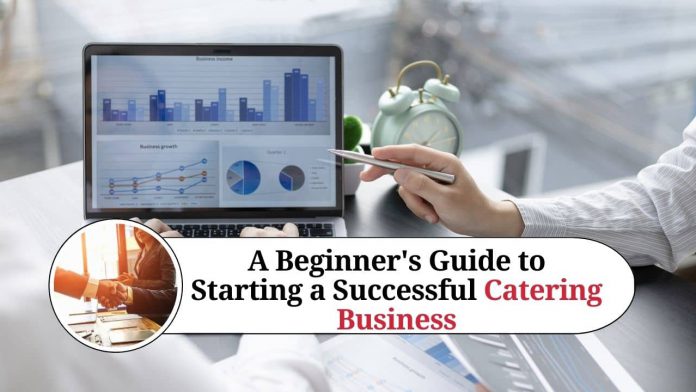Introduction:
Catering is a thriving business that provides food services for a wide range of events, from small gatherings to large corporate events. If you love cooking and enjoy working with people, starting a catering business can be a great way to turn your passion into a profitable venture. In this blog, we’ll discuss everything you need to know to start a successful catering business.
Market Research:
Before starting a catering business, it’s essential to do your research and understand your target market. You should analyze the local market to determine the competition, customer preferences, and pricing trends. This will help you to identify your unique selling point and develop a business plan that aligns with your goals.
Business Plan:
A well-defined business plan is critical to starting a successful catering business. Your business plan should outline your company’s objectives, target market, services, and pricing. It should also include a marketing plan, financial projections, and a detailed operational plan.
Legal Requirements:
To operate a catering business, you’ll need to register your business and obtain the necessary licenses and permits. You should research the local and state requirements for catering businesses and ensure that you comply with all the regulations.
Menu Development:
The success of your catering business depends on the quality of your food. You should develop a menu that caters to your target market’s preferences and dietary needs. You can also offer specialized menus for events such as weddings, corporate events, and parties.
Equipment and Supplies:
To operate a catering business, you’ll need commercial-grade equipment and supplies. You should invest in quality equipment, including ovens, refrigerators, food warmers, and serving dishes. You should also consider purchasing supplies such as plates, utensils, and tablecloths.
Marketing and Promotion:
Marketing and promotion are critical to the success of any catering business. You should develop a marketing plan that includes advertising, social media marketing, and networking. You can also offer free tastings to potential clients to showcase your food and services.
Staffing and Management:
To provide excellent service to your clients, you’ll need to hire a competent staff. You should recruit chefs, servers, and other staff members who have experience in the catering industry. You should also develop an effective management system to ensure that your business runs smoothly.
Pricing Strategies:
Pricing is an essential aspect of any catering business. You should determine the cost of ingredients, labor, and overheads and develop pricing strategies that align with your business objectives. You can offer tiered pricing based on the size of the event or create custom packages for clients.
Vendor Management:
To operate a successful catering business, you’ll need to develop relationships with vendors such as food suppliers, rental companies, and event planners. You should establish a system for vendor management to ensure that you have access to the best supplies and services at competitive prices.
Customer Service:
Customer service is critical to the success of any catering business. You should provide excellent service to your clients by listening to their needs, communicating effectively, and providing timely responses. You should also follow up with clients after events to obtain feedback and improve your services.
Business Expansion:
As your catering business grows, you may consider expanding your services. You can add new menu items, expand your service area, or offer additional services such as event planning or equipment rental. You should have a long-term growth plan that aligns with your business objectives.
Insurance and Liability:
To protect your catering business from risks such as accidents or property damage, you’ll need to have insurance coverage. You should research insurance options that are specific to the catering industry, such as liability insurance, property insurance, and workers’ compensation insurance.
Technology and Innovation:
Technology and innovation can help your catering business to streamline operations and improve efficiency. You can use catering software to manage orders, inventory, and invoices, and invest in innovative equipment that reduces food waste and energy consumption.
Sustainability:
Sustainability has become a significant concern for many customers, and incorporating sustainable practices in your catering business can be an excellent selling point. You can use locally-sourced ingredients, reduce food waste, and use eco-friendly packaging to attract environmentally-conscious clients.
Niche Specialization:
Niche specialization can help your catering business stand out from the competition. You can focus on a specific cuisine, such as vegan or gluten-free, or specialize in catering to a particular type of event, such as weddings or corporate events. This can help you establish a reputation as a go-to caterer in that niche.
Quality Control:
Maintaining consistent quality is essential to the success of any catering business. You should establish a system for quality control, such as recipe testing, staff training, and food safety protocols, to ensure that your clients receive high-quality food and services.
Network and Collaborate:
Networking and collaborating with other businesses in the food and events industry can help you expand your reach and generate new leads. You can attend industry events, participate in catering associations, and collaborate with event planners or rental companies to provide a comprehensive service to your clients.
Customer Retention:
Customer retention is critical to the long-term success of your catering business. You should develop a system for customer retention, such as loyalty programs or referral incentives, to encourage repeat business and positive word-of-mouth.
Professional Development:
Continued professional development can help you stay up-to-date with industry trends and develop new skills. You can attend industry conferences, take cooking classes, or enroll in business courses to improve your catering business’s operations and service.
Conclusion:
Starting a catering business can be a challenging yet rewarding venture that requires careful planning, hard work, and dedication. By following the steps outlined in this blog and incorporating additional strategies such as pricing, vendor management, customer service, business expansion, insurance, and technology, you can create a successful catering business that meets the needs of your clients and achieves your business objectives.
Read more useful content:
Frequently Asked Questions (FAQ’s)
Q1.) What is a catering business?
A catering business provides food and beverage services to customers at events such as weddings, corporate functions, and parties.
Q2.) How do I start a catering business?
To start a catering business, you will need to create a business plan, obtain the necessary licenses and permits, purchase equipment, and hire staff. You can also consider attending culinary school to develop your skills.
Q3.) What type of events do caterers typically serve?
Caterers can serve a wide range of events, from small private dinners to large corporate events, weddings, and other celebrations.
Q4.) What type of food do caterers typically serve?
Caterers can serve a wide range of food types, from traditional dishes to fusion cuisine. The menu will often depend on the type of event and the client’s preferences.
Q5.) How do caterers price their services?
Caterers typically price their services based on the number of guests, the type of menu, and the level of service required. They may also charge additional fees for equipment rentals, staff, and other services.
Q6.) Can caterers provide alcohol at events?
Caterers may be able to provide alcohol at events, but this will depend on the catering company’s licensing and the laws in the jurisdiction where the event is taking place.
Q7.) How do caterers manage food allergies and dietary restrictions?
Caterers should be able to accommodate food allergies and dietary restrictions by offering a range of menu options and ensuring that staff are trained to handle food safely and prevent cross-contamination.
Q8.) How do caterers ensure food safety?
Caterers should follow strict food safety protocols to ensure that food is handled, prepared, and stored safely. This includes regular cleaning, temperature control, and safe food handling practices.
Q9.) Can caterers provide other services besides food and beverage?
Caterers may be able to provide other services besides food and beverage, such as equipment rentals, event planning, and staffing. These additional services may be charged separately from the catering services.




















